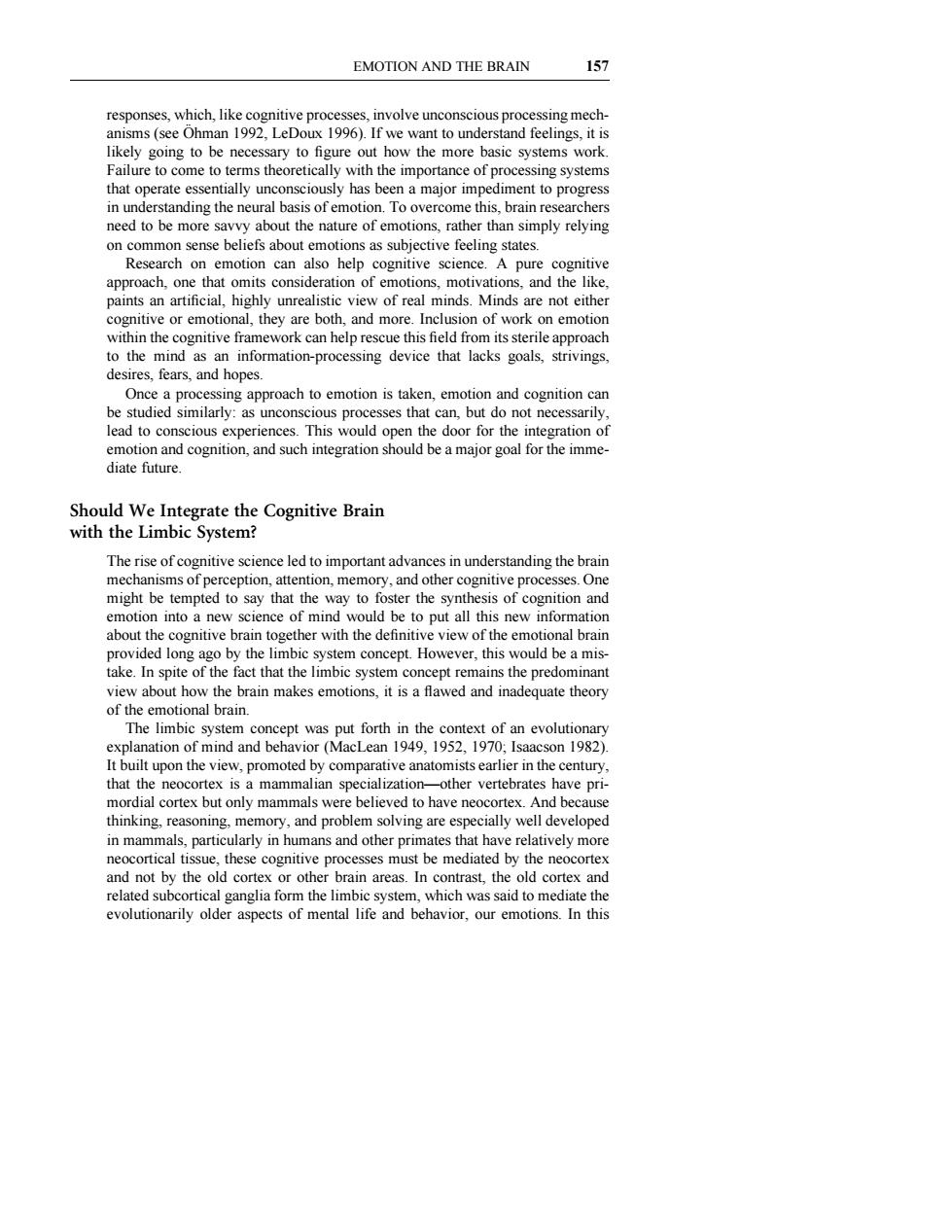正在加载图片...

EMOTION AND THE BRAIN 157 responses,which,like cognitive processes,involve unconscious processing mech- 10 e wa nt to und erstand feelings that operate essentially unconsciously has been a major impediment to progress an the neural this brain res Research on emotion can also help cognitive science.A pure cognitive unre sare not eithe within the cognitive framework can help rescue this field from its sterile approach to the mind as an information-processing device that lacks goals,strivings, s,fears,and hopes ,em he s s tha lead to conscious experiences.This would open the door for the integration of dimte endu eme Should We Integrate the Cognitive Brain with the Limbic System? nisms of pe might be tempted to say that the way to foster the synthesis of cognition and new information y the limbi akefact ahey orm the predominant view about how the brain makes emotions,it is a flawed and inadequate theory of出 of a It built upon the view,promoted by comparative anatomistsearlier in the century. ther vertebrates have pr in mammals,particularly in humans and other primates that have relatively more neocortical tissue,these cognitive processes must be mediated by the neocortex and not by the old cort or other brain areas.In contrast,th old cortex an EMOTION AND THE BRAIN 157 responses, which, like cognitive processes, involve unconscious processing mechanisms (see O¨ hman 1992, LeDoux 1996). If we want to understand feelings, it is likely going to be necessary to figure out how the more basic systems work. Failure to come to terms theoretically with the importance of processing systems that operate essentially unconsciously has been a major impediment to progress in understanding the neural basis of emotion. To overcome this, brain researchers need to be more savvy about the nature of emotions, rather than simply relying on common sense beliefs about emotions as subjective feeling states. Research on emotion can also help cognitive science. A pure cognitive approach, one that omits consideration of emotions, motivations, and the like, paints an artificial, highly unrealistic view of real minds. Minds are not either cognitive or emotional, they are both, and more. Inclusion of work on emotion within the cognitive framework can help rescue this field from its sterile approach to the mind as an information-processing device that lacks goals, strivings, desires, fears, and hopes. Once a processing approach to emotion is taken, emotion and cognition can be studied similarly: as unconscious processes that can, but do not necessarily, lead to conscious experiences. This would open the door for the integration of emotion and cognition, and such integration should be a major goal for the immediate future. Should We Integrate the Cognitive Brain with the Limbic System? The rise of cognitive science led to important advances in understanding the brain mechanisms of perception, attention, memory, and other cognitive processes. One might be tempted to say that the way to foster the synthesis of cognition and emotion into a new science of mind would be to put all this new information about the cognitive brain together with the definitive view of the emotional brain provided long ago by the limbic system concept. However, this would be a mistake. In spite of the fact that the limbic system concept remains the predominant view about how the brain makes emotions, it is a flawed and inadequate theory of the emotional brain. The limbic system concept was put forth in the context of an evolutionary explanation of mind and behavior (MacLean 1949, 1952, 1970; Isaacson 1982). It built upon the view, promoted by comparative anatomists earlier in the century, that the neocortex is a mammalian specialization—other vertebrates have primordial cortex but only mammals were believed to have neocortex. And because thinking, reasoning, memory, and problem solving are especially well developed in mammals, particularly in humans and other primates that have relatively more neocortical tissue, these cognitive processes must be mediated by the neocortex and not by the old cortex or other brain areas. In contrast, the old cortex and related subcortical ganglia form the limbic system, which was said to mediate the evolutionarily older aspects of mental life and behavior, our emotions. In this